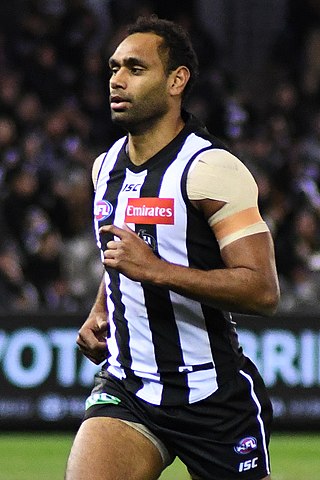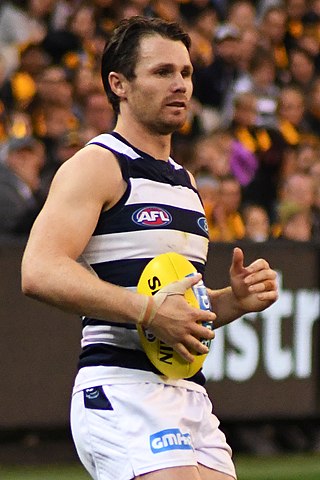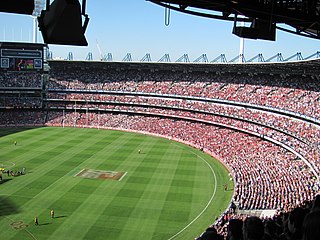Related Research Articles

Gary Ablett Jr. is a former professional Australian rules footballer who played for the Geelong Football Club and Gold Coast Suns in the Australian Football League (AFL). The eldest son of Australian Football Hall of Fame member and former Hawthorn and Geelong player Gary Ablett Sr., Ablett was drafted to Geelong under the father–son rule in the 2001 national draft and has since become recognised as one of the all-time great midfielders. Ablett is a dual premiership player, dual Brownlow Medallist, five-time Leigh Matthews Trophy winner, three-time AFLCA champion player of the year award winner and eight-time All-Australian.

Matthew Scarlett is a former Australian rules footballer, who formerly played for the Geelong Football Club in the Australian Football League (AFL). A fullback, who is 1.92 metres tall and weighing 94 kilograms (207 lb), Scarlett is the eldest son of former Geelong footballer John Scarlett.
Adrian Fletcher is a former Australian rules footballer and current assistant coach. He is regarded as one of football's nomads, having played for five Australian Football League clubs in his 13-year career. Fletcher's play relied on being an excellent play reader which resulted in him being a prolific possession gatherer, especially by handball.

Nick Dal Santo is the senior coach of the St Kilda Football Club in the AFL Women's competition and a retired Australian rules footballer who played for St Kilda and North Melbourne in the Australian Football League (AFL).

Travis Varcoe is a retired Australian rules footballer who played in the Australian Football League (AFL) for the Geelong Football Club from 2006 to 2014 and for the Collingwood Football Club from 2015 to 2020. He currently serves as an assistant coach for the Western Bulldogs. He also appeared as a contestant on the 7th season of I'm a Celebrity...Get Me Out of Here!.

Paul Chapman is a former professional Australian rules footballer who played for the Geelong Football Club and Essendon Football Club in the Australian Football League (AFL).

Bradley David Walter Scott is a former Australian rules footballer who is currently the coach of the Essendon Football Club in the Australian Football League (AFL). He played for Hawthorn and the Brisbane Lions, and was previously the coach of the North Melbourne Football Club from 2010 until 2019.

Thomas John Hawkins is an Australian rules footballer playing for the Geelong Football Club in the Australian Football League (AFL). At 198 cm tall and weighing 110 kilograms (240 lb), Hawkins has the ability to play as either a full-forward or centre half-forward. He grew up in New South Wales before moving to Victoria to attend Melbourne Grammar School, where his football abilities earned him a spot in the first XVIII in year ten. He played top-level football with the Sandringham Dragons in the TAC Cup and Vic Metro in the AFL Under-18 Championships. His accolades as a junior include national and state representation, the Larke Medal as the AFL Under-18 Championships most valuable player, and All-Australian selection.

Cameron Mooney is a former Australian rules footballer who played with the North Melbourne and Geelong Football Clubs in the Australian Football League (AFL). A forward, standing at 197 cm Mooney is renowned for his passion along with his poor tribunal history where he holds the record for the most suspensions in a single season by a VFL/AFL player.

Mathew Stokes is a former professional Australian rules footballer who played with the Geelong Football Club and the Essendon Football Club in the Australian Football League (AFL).

Tom Lonergan is a former professional Australian rules footballer who played for the Geelong Football Club in the Australian Football League (AFL).

Ross Lyon is a former Australian rules football player and the current senior coach of the St Kilda Football Club in the Australian Football League (AFL). He previously coached St Kilda from 2007 to 2011 and the Fremantle Football Club from 2012 to 2019. He played for Fitzroy and the Brisbane Bears from 1985 to 1995.

Joshua Hunt is a former professional Australian rules footballer who played for the Geelong Football Club the Greater Western Sydney Giants in the Australian Football League.

Shane Mumford is a former professional Australian rules footballer who most recently played for the Greater Western Sydney Giants in the Australian Football League (AFL). He has also previously played for the Geelong Football Club and the Sydney Swans. He was a part of Sydney's 2012 premiership team.
The Collingwood Football Club is an Australian rules football club playing in the Australian Football League.

Patrick Dangerfield is a professional Australian rules footballer playing for the Geelong Football Club in the Australian Football League (AFL). He previously played for the Adelaide Football Club from 2008 to 2015. He has served as Geelong captain since the 2023 season.

Joshua Nicholas Caddy is a former professional Australian rules footballer who last played for the Richmond Football Club in the Australian Football League (AFL). He previously played for the Gold Coast Football Club from 2011 to 2012, and the Geelong Football Club from 2013 to 2016. Caddy was drafted by Gold Coast with the seventh selection in the 2010 AFL draft after captaining underage football with the Northern Knights in the TAC Cup. He was a premiership player with Richmond in both 2017 and 2019.

The 2011 AFL Grand Final was an Australian rules football game contested between the Collingwood Football Club and the Geelong Football Club, held at the Melbourne Cricket Ground on 1 October 2011. It was the 116th annual grand final of the Australian Football League, staged to determine the premiers for the 2011 AFL season. The match, attended by 99,537 spectators, was won by Geelong by a margin of 38 points, marking the club's ninth VFL/AFL premiership victory. Geelong's Jimmy Bartel was awarded the Norm Smith Medal as the best player on the ground.
The history of the Geelong Football Club, began in 1859 in the city of Geelong, Australia, is significant as the club is the second oldest AFL club, is believed to be the fourth oldest football club in Australia and one of the oldest in the world and one of the most successful. Initially playing under its own rules, some of which, notably, were permanently introduced into Australian Football. It adopted the Laws of Australian Football in the early 1860s after a series of compromises with the Melbourne Football Club.